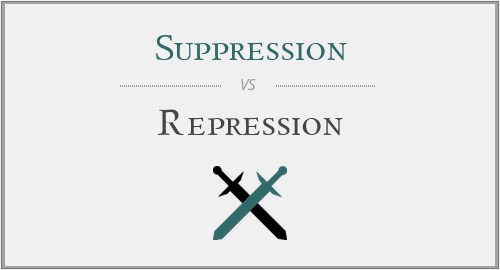
• Do you know the difference between “suppression” and “repression?”
To understand the differences and similarities between these two words, we must first enter the world of psychology and Freud. Freud believed that when we are confronted with certain intense stimuli, we protect ourselves and cope by using an array of defense mechanisms.
“Suppression” and “repression” are two types of defense mechanisms that our mind uses to push those intense sensations away, hoping that in the future, we will have the resources to deal with them more effectively.
What is Suppression?
What are the Latin roots of the word “suppression?”
The word suppression comes from the Latin word “suppressus”: “sub” which means “under, below” and “premere” which means “hold, press.”
How was the word “suppression” defined in the past?
It was used the first time in the 14th century when it was defined as “being burdensome.” Later in the 1500’s, it meant “to be stifled by force or by authority. “
How is the word “suppression” defined today?
We currently use the word “suppression” to define a thought, a feeling, or a memory that we are pushing away consciously. We are deliberately choosing not to focus on this thought or feeling, and not to act on it. We are aware that we may have to deal with these feelings if they arise in the future, but we prefer not to confront them in the present moment.
For example:
• Although I haven’t eaten since last night, I suppress the feeling of hunger and focus instead on my lesson.
For example:
What is Repression?
What are the Latin roots of the word “repression?”
The word “repression” comes from the Latin word “repressus”: “re” which means “back” and “premere” which means “hold, press.”
When was the word “repression” used in the past?
It was used for the first time in the 14th century. Later, in the late 19th century, it was used for the first time in its psychological context.
How is the word “repression” defined today?
"Repression" is defined as the unconscious inhibition of sensations or feelings. "Repression" is an unconscious mental act where anxious or distressing memories or thoughts become inaccessible to the conscious mind and instead are pushed into the unconscious mind, where they continue to function in secret.
For example:
"Repression" is also used to describe something that is "subdued by force."
For example:
How are “Suppression” and “Regression” Different?
• Both “repression” and “suppression” are defense mechanisms.
• Both “repression” and “suppression” work to decrease the intensity of negative thoughts and feelings to help a person maintain inner psychological balance.
• “Suppression” is a conscious act and a choice that we purposely make while “repression” is an unconscious act and a mechanism that functions outside of our awareness.
• The “suppression” of feelings and thoughts is often seen to be a positive coping mechanism, helping us deal with difficult emotions in a constructive, prosocial way while the “repression” of feelings and thoughts is often seen as a negative coping mechanism, numbing us to difficult emotions which might best be confronted: "repression" prevents us from understanding ourselves and dealing with our emotions in a mature and direct manner.
• What we have “suppressed” is retrieved more easily from our consciousness than what we have "repressed."
Thus, “repression” can lead to more severe consequences when our unconscious feelings control our psychological state and behavior without our awareness.
Final Thoughts
In our lives, we "suppress" and "repress" many emotions that we find overwhelming.
Think about “suppression.”
Think about “repression.” When we overreact in a situation, we might be acting from our “repressed” emotions.
• When has this happened to you?
Notice how the differences between these similar words are very significant when examining them in the light of our daily behavior.
Two final questions:
• Do you now know the difference between “suppression” and “repression?”




Have a discussion about this article with the community:
Report Comment
We're doing our best to make sure our content is useful, accurate and safe.
If by any chance you spot an inappropriate comment while navigating through our website please use this form to let us know, and we'll take care of it shortly.
Attachment
You need to be logged in to favorite.
Log In